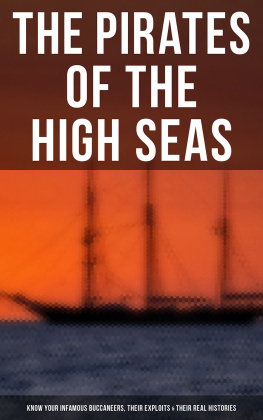THERE IS, IN THE DEEDS of men of action, an interest which is never aroused by those persons of brains and capacity by whom the world is really ruled. The statesman in his cabinet is the god within the machine; it is he who directs the acts of nations, it is he who moves the fleets and armies as if they were pieces on the chess-board; to him, as a rule, is the man of action subordinate, obeying his behests. Rule and governance are his, power both in the abstract and the concrete. Seldom in the history of the world do we come across the men who are at one and the same time statesmen and soldiers, who, taking their destiny in their own hands, work it out to the appointed end thereof. But, as we stray in the by-paths of history, we meet with some who, in their day, have influenced not only the age in which they lived themselves, but also the destinies of generations yet unborn. It would seem incredible that mere pirates, such as the Muslim corsairs of the Mediterranean, could be included in this category, and yet, as their story is unfolded, we shall see how the Sea-wolves rose from the humblest beginnings to trouble the peace of Europe, to found for themselves dynasties which endured.
Uruj Barbarossa, Kheyr-ed-Din Barbarossa, Dragut Reis, and Occhiali, or All Basha, were men who, in the sixteenth century, did much to change the conditions of the times in which they lived: it was the time of the Renaissance in Europe, a period of splendour in all the arts and sciences. These men added nothing to the knowledge of the civilised world as it then existed, save and except in one particular, which was, as Kheyr-ed-Din explained to Soliman the Magnificent on a certain memorable occasion, that he who rules on the sea will rule on the land also. In the present day, when all the nations and languages sit at the feet of Captain (now Rear-Admiral) Mahan, and acclaim his Sea Power series of books, it is interesting to find that he was anticipated in the most practical fashion possible by a corsair of the sixteenth century.
This period was one in which great men abounded. The Emperor Charles V., Francis I. of France, and Henry VIII. of England, were on the thrones of their respective countries; in Hungary was John Hunyadi, at Constantinople Soliman the Magnificent held rule, while in Rome the fatal house of Medici were the successors of Saint Peter. War was a commonplace state of the times, but until the Crescent began to sweep the seas it had its manifestation in the perpetual quarrels of the nations of Christendom, which represented, as a rule, the insatiable ambitions of its rulers. But now new men forced themselves to the front, a new power arose which was very imperfectly understood, and which practically held the sea at its mercy. Gone were the halcyon days of peaceful trade which had been pursued for generations by Venetian and Genoese, by Spaniard and Frenchman; gone also, apparently never to return, was all sense of security for the wretched dwellers on the littoral of the Mediterranean, who lived in daily, and particularly in nightly, dread of the falcon swoop of the pirate galleys.
It is amusing to read the old chroniclers, sticklers as they were for the dignity of history, continually having to turn aside from the main stream of their narrative of emperors, popes, and kings to descend to the level of the Sea-wolves, and to be constrained to set down the nefarious doings of these rovers of the sea. Bell, book, and candle were invoked against them in vain, and mighty monarchs had to meet them in the stricken field not merely once or twiceto their utter undoing and discomfiturebut many times, while victory inclined first to one side and then to the other.
The Osmanli had ever been warriors since the times of the Prophet, of Abu-Bekr, of Othman, and of Ali; but so far their warlike achievements had been always on land, their only sea experience being confined to the crossing of the Straits of Gibraltar, when in the eighth century, under Tarik, they had swarmed into Andalusia, conquered Roderick the Goth, and set up that Muslim domination in Southern Spain which lasted until 1492, just before the events set forth in this book took place. Piracy in all ages is a thing in which a curious shuddering interest has been taken, and the deeds of the outlaws of the sea have never lacked chroniclers. There is for this a reason apart from the record of robbery and murder, which is the commonplace of piratical deeds: it resides in the perennial interest which men take in individual achievement, in the spectacle of absolute and complete domination by one man over the lives and the fortunes of others. This intense form of individualism is nowhere so well exhibited as in the story of piratical enterprise, where a band of men, outside of the law and divorced from all human kind by the atrocity of their deeds, has had to be welded into one homogeneous mass for the purpose of preying upon the world at large. Therefore he who would hold rule among such outlaws must himself be a man of no common description, for in him must be that quality which calls for instantaneous obedience among those with whom he is associated; behind him is no constituted authority, discipline is personal, enforced by the leader, and by him alone. Beneath him are men of the rudest and roughest description, slaves to their lusts and their passions, prone to mutiny, suspicious, andworst of allstupid.
It is with these constituent elements that the piratical leader had to deal, trusting to the strength of his own arm, the subtlety of his own unassisted brain. Some among these leaders have risen to eminence in their evil lives, most of them have been the captains of single ships preying on commerce in an indiscriminate manner; but this was not the case with the Sea-wolves of the Mediterranean, Primarily sea-robbers they were of course, but as time and opportunity developed their characters they rose to meet occasion, to take fortune at the flood, in a manner that, had they been pursuing any other career, would most certainly have caused them to rise to eminence. Into the fierce and blood-stained turmoil of their lives there entered something unknown to any other pirates: this was religious fanaticisma fanaticism so engrained in character, a belief held to with such passionate tenacity, that men stained with every conceivable crime held that their passage to Paradise was absolutely secure because of the faith which they professed. Tradition, sentiment, discipline, were summed up in one trite formula; but though we, at this distance of time, may hold it somewhat in derision, it was a vital force in the days of Soliman the Magnificent; and there was an added zest to robbery and murder in the fact that the pirates, as good Mohammedans, were obeying the behests of the Prophet every time that they cut a Christian throat, plundered a Christian argosy, or carried off shrieking women into a captivity far worse than death.










